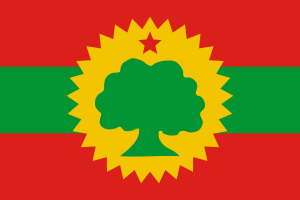Language/Borana-arsi-guji-oromo/Grammar/Future-Tense
Hi Borana-Arsi-Guji Oromo learners! 😊
In this lesson, we will cover the future tense in the Borana-Arsi-Guji Oromo language. As always, we will include some cultural information and interesting facts. By the end of this lesson, you will know how to use the future tense in context and have a deeper understanding of the Borana-Arsi-Guji Oromo language. So, let's get started!
Introduction[edit | edit source]
In the present tense, we talked about the basic structure of Oromo verbs, and how they use suffixes to agree with the subject of the sentence. The same structure of adding suffixes to the verb for tense applies to create future tense as well.
For example, in the sentence "I will see you", the verb 'see' needs to be in the future tense and it is done by adding -ee to the verb.
I+- see+-ee you.
The suffix -ee indicates the future tense. We will explore this concept further in the next section.
Finish this lesson and explore these related pages: Negation & Give your Opinion.
Forming the Future Tense[edit | edit source]
As in the example, the future tense is formed by adding the suffix -ee to the root verb or noun. However, if you are using a pronoun in the sentence, suffixes are applied to both the pronoun and the verb.
Table 1 displays the table of subject and suffix agreement for Borana-Arsi-Guji Oromo verbs in the future tense.
| Pronoun | Future Tense Suffix |
|---|---|
| I | -ee-ni |
| You (singular) | -ee-ti |
| He/She | -ee-ti |
| We | -ee-n |
| You (plural) | -ee-ti |
| They | -ee-ti |
Let's look at some examples with pronouns:
- I will eat -> An + Ess + -eeni. (Aness-eeni)
- You will eat -> At + Ess + -eeti. (Atess-eeti)
- He will eat -> Ish + Ess + -eeti. (ishEss-eeti)
- We will eat -> Nu + Ess + -een. (Nuess-een)
- You (plural) will eat -> Holaa + Ess + -eeti. (HolaaEss-eeti)
- They will eat -> Isin + Ess + -eeti. (IsinEss-eeti)
As you can see, each pronoun has its suffix that agrees with the future tense suffix -ee.
Note that verbs in Borana-Arsi-Guji Oromo are usually formed from roots (bare) without the "to" such as "to go" or "to run" in English. So, when creating a verb in the future tense, we add the suffix -ee to the bare root, for example, "run" in English is "gongo" in Borana-Arsi-Guji Oromo, and in future tense, it is "gongoee".
When the verb ends with a vowel, you simply add -ee, but when the verb ends with a consonant, we must add -a before the final suffix -ee. For example, the bare root "tar" (to buy) becomes "taraee".
Now let's have a dialogue to see how the future tense works in context:
Dialogue:
- Person 1: Obbolaynu mura dhabeetin laallee dulaa. (Tomorrow I will go to the market with my friend.)
- Person 2: Arraba hubannoo irraa fuudhee galateesii. (Good idea! I will meet you there around noon.)
Vocabulary[edit | edit source]
Let's learn some vocabulary related to the future tense:
| Borana-Arsi-Guji Oromo | Pronunciation | English Translation |
|---|---|---|
| Nooti | no-oh-ti | Tomorrow |
| Amma koo | um-ma koh | The day after tomorrow |
| Weellisaa | weg-li-sa | The future |
| Mee bakka | me bak-ka | Next week |
| Akkasumas | ak-ka-su-mas | The coming year |
These words will be useful when talking about the future tense in Borana-Arsi-Guji Oromo.
Culture and Facts[edit | edit source]
Borana-Arsi-Guji Oromo people have a rich culture, and their language reflects their traditions, beliefs, and way of life. The Borana-Arsi-Guji Oromo people are known for their horse-riding skills and have an equestrian culture. The Oromo horse culture is best illustrated through the Borana horse race festival, which is held once per year to celebrate the skills of riders and horses. The festival is an opportunity to showcase the skills of skilled jockeys, the beauty of the horses themselves, and to celebrate the love between the Oromo people and their horses.
If you want to learn more about Oromo culture and its contribution to humanity, there are a couple of wikipedia pages you can visit:
Sources[edit | edit source]
➡ If you have any questions, please ask them in the comments section below.
➡ Feel free to edit this wiki page if you think it can be improved. 😎

